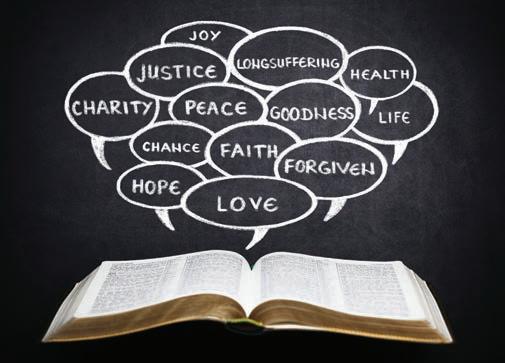SPIRIT
A WORD OF TORAH
As We Are Judged on Rosh Hashanah, Will We Receive Divine Justice or Divine Mercy? I dedicate this essay to the memory of my late friend, David Dolinko. We were schoolmates from second or third grade through high school. He went on to earn a Ph.D. in philosophy, then a law degree and served as professor of law at UCLA for many decades. He wrote about the philosophical underpinnings of laws punishing criminal behavior. David was among the most brilliant thinkers I’ve ever met — which says a lot, since my life has been blessed by encounters with a collection of extraordinary, brilliant thinkers.
D
oes the impulse to act with mercy contradict strict justice? Apparently yes, according to Rabbi Yehudah as recorded in the Talmud. Rabbi Yehudah audaciously answers an astonishing question, “What does God do every day?” Rabbi Yehudah’s description of the Divine schedule: “The day has 12 hours. During the first three, the Holy Blessed One sits occupied with Torah. During the second three, he sits and judges the entire world. When he sees that the world deserves destruction, he stands up from the throne Louis of justice (Hebrew “din”) and Finkelman sits on the throne of mercy Contributing Writer (Hebrew “rachamim”). … During the fourth, he sits and plays with the leviathan (Avodah Zarah 3b).” Similarly, various rabbis assert that when we sound the shofar, God moves from the throne of justice to the throne of mercy (Vayikra Rabbah 29: 3, 4, 6 and 10). God can sit on the throne of justice at one moment and on the throne of mercy, but not on both at once. The two thrones are distinct. In the Selichot, the penitential prayers
66
|
the wicked in Gehenom” (1:9).[i]. But what can we do? Mercy and justice negate each other. They cannot coexist without breaking the law of contradiction. So, we speak of the One God, just and merciful, as if relating to us from different sephirot, or sitting on different thrones. We have to, because justice contradicts mercy, and mercy contradicts justice. But what if they do not?
that appear so prominently at this time of year, we repeatedly refer to God as “King sitting on a throne of mercy.” The prayer implies that same God could also sit on the throne of justice. Maimonides, of course, warns us not to take literally any description of God as sitting, or standing, and not to indulge in the idea of the throne as anything but a metaphor for rulership (Guide of the Perplexed 1:9). I leave that thought for another discussion. Today I want to focus on the two thrones. Apparently “the throne of mercy” cannot also serve as “the throne of justice” because justice and mercy remain incompatible. Even if we allow the thrones as metaphors, the notion that God relates to us sometimes in one mode and sometimes in its opposite seems highly problematic. Kabbalistic texts also make a sharp distinction between the sephirah (attribute of God) of chesed (kindness) and the sephirah of gevurah (power). According to Reshit Hokhmah, a 16th-century source, “Chesed is Pure Kindness, though only to the meritorious, as is the reward of the righteous in Gan Eden. Gevurah is Pure Judgment and retribution to the guilty, as is the punishment of
JUSTICE VS. MERCY How do justice and mercy really relate to each other? My late friend, David Dolinko, with modesty typical of him, called his inquiry into the question, “Some Naive Thoughts about Justice and Mercy” (core.ac.uk/download/ pdf/159587369.pdf). He states the paradox in these words: Mercy is ordinarily conceived as a virtue, as a free gift rather than something to which one has a right or entitlement, and as something distinct from justice (to which, of course, one does have a right). In appropriate cases, mercy “tempers” justice, producing a different outcome than justice alone would call for. Yet, isn’t a deliberate departure from the requirements of justice an injustice? The conflict between mercy and justice, according to Dolinko, arises primarily in the context of punishment. According to justice, the offender deserves some punishment, but one may, mercifully, mitigate the punishment. If one mitigates the punishment, though, one has departed from justice. Why does the offender deserve punishment? Dolinko answers: Punishment itself, of course, has long been a source of contention — why is it ever justified? The principal answers that legal philosophers have given continued on page 68
SEPTEMBER 2 • 2021




















